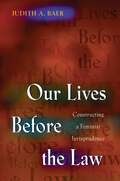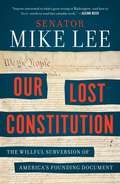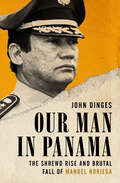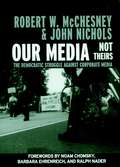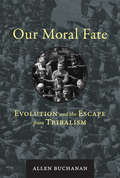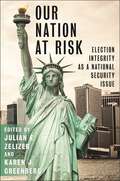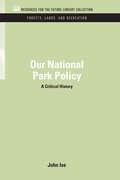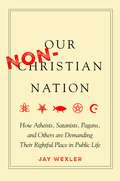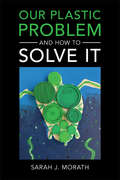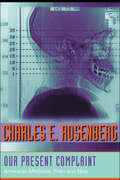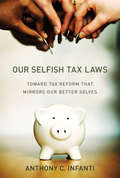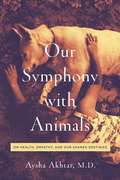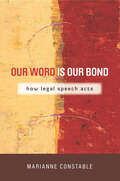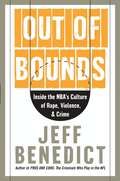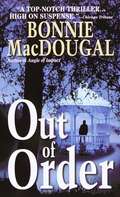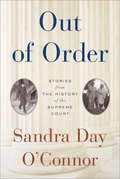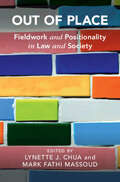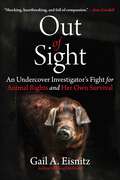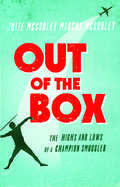- Table View
- List View
Our Lives Before the Law: Constructing a Feminist Jurisprudence
by Judith A. BaerAccording to Judith Baer, feminist legal scholarship today does not effectively address the harsh realities of women's lives. Feminists have marginalized themselves, she argues, by withdrawing from mainstream intellectual discourse. In Our Lives Before the Law, Baer thus presents the framework for a new feminist jurisprudence--one that would return feminism to relevance by connecting it in fresh and creative ways with liberalism. Baer starts from the traditional feminist premise that the legal system has a male bias and must do more to help women combat violence and overcome political, economic, and social disadvantages. She argues, however, that feminist scholarship has over-corrected for this bias. By emphasizing the ways in which the system fails women, feminists have lost sight of how it can be used to promote women's interests and have made it easy for conventional scholars to ignore legitimate feminist concerns. In particular, feminists have wrongly linked the genuine flaws of conventional legal theory to its basis in liberalism, arguing that liberalism focuses too heavily on individual freedom and not enough on individual responsibility. In fact, Baer contends, liberalism rests on a presumption of personal responsibility and can be used as a powerful intellectual foundation for holding men and male institutions more accountable for their actions. The traditional feminist approach, Baer writes, has led to endless debates about such abstract matters as character differences between men and women, and has failed to deal sufficiently with concrete problems with the legal system. She thus constructs a new feminist interpretation of three central components of conventional theory--equality, rights, and responsibility--through analysis of such pressing legal issues as constitutional interpretation, reproductive choice, and fetal protection. Baer concludes by presenting the outline of what she calls "feminist post-liberalism": an approach to jurisprudence that not only values individual freedoms but also recognizes our responsibility for addressing individuals' needs, however different those may be for men and women. Powerfully and passionately written, Our Lives Before the Law will have a major impact on the future course of feminist legal scholarship.
Our Lost Constitution
by Mike LeeThe still-unfolding story of America's Constitution is a history of heroes and villains--the flawed visionaries who inspired and crafted liberty's safeguards, and the shortsighted opportunists who defied them. Those stories are known by few today.In Our Lost Constitution, Senator Mike Lee tells the dramatic, little-known stories behind six of the Constitution's most indispensible provisions. He shows their rise. He shows their fall. And he makes vividly clear how nearly every abuse of federal power today is rooted in neglect of this Lost Constitution. For example: * The Origination Clause says that all bills to raise taxes must originate in the House of Representatives, but contempt for the clause ensured the passage of Obamacare. * The Fourth Amendment protects us against unreasonable searches and seizures, but the NSA now collects our private data without a warrant. * The Legislative Powers Clause means that only Congress can pass laws, but unelected agencies now produce ninety-nine out of every one hundred pages of legal rules imposed on the American people.Lee's cast of characters includes a former Ku Klux Klansman, who hijacked the Establishment Clause to strangle Catholic schools; the Chief Justice of the Supreme Court, who called the Second Amendment a fraud; and the revered president who began his first of four terms by threating to shatter the balance of power between Congress and the president, and who began his second term by vowing to do the same to the Supreme Court.Fortunately, the Constitution has always had its defenders. Senator Lee tells the story of how Andrew Jackson, noted for his courage in duels and politics, stood firm against the unconstitutional expansion of federal powers. He brings to life Ben Franklin's genius for compromise at a deeply divided constitutional convention. And he tells how in 2008, a couple of unlikely challengers persuaded the Supreme Court to rediscover the Second Amendment's right to keep and bear arms.Sections of the Constitution may have been forgotten, but it's not too late to bring them back--if only we remember why we once demanded them and how we later lost them. Drawing on his experience working in all three branches of government, Senator Lee makes a bold case for resurrecting the Lost Constitution to restore and defend our fundamental liberties.From the Hardcover edition.
Our Man in Panama: The Shrewd Rise and Brutal Fall of Manuel Noriega
by John DingesA &“carefully researched&” account of the rise and fall of notorious dictator Manuel Noriega—and America&’s role in both (The Washington Post). Written by a prize-winning NPR veteran who spent years covering Latin America, this blend of biography, history, and political reporting details the events that lead to the American invasion of Panama. &“Describes in considerable detail the fascinating and appalling relationship between Noriega and the U.S. government. Much of this material was derived from previously classified documents, supplemented by Congressional hearings and interviews. [John] Dinges has taken great care to verify his sources; hearsay, gossip, and questionable testimony is not presented here . . . Highly recommended.&” —Library Journal &“Most of the action takes place in Panama, of course, but it is still very much a Washington story. Few of the characters, from President Bush on down, emerge with dignity intact.&” —The New York Times &“One of the best analyses of American foreign policy failures in Panama.&” —The New Republic A New York Times Notable Book of the Year
Our Media, Not Theirs: The Democratic Struggle Against Corporate Media (Open Media Series)
by Noam Chomsky Robert W. Mcchesney John Nichols Barbara Ehrenreich Ralph NaderOur Media, Not Theirs! The Democratic Struggle Against Corporate Media examines how the current media system in the United States undermines democracy, and what we can do to change it. McChesney and Nichols begin by detailing how the media system has come to be dominated by a handful of transnational conglomerates that use their immense political and economic power to saturate the population with commercial messages. Further, the authors provide an analysis of the burgeoning media reform activities in the United States, and outline ways we can structurally change the media system through coalition work and movement-building: the tools we need in order to battle for a better media.
Our Moon has Blood Clots: The Exodus Of The Kashmiri Pandits
by Rahul PanditaRahul Pandita was fourteen years old in 1990 when he was forced to leave his home in Srinagar along with his family, who were Kashmiri Pandits: the Hindu minority within a Muslim majority Kashmir that was becoming increasingly agitated with the cries of ‘Azadi’ from India. The heartbreaking story of Kashmir has so far been told through the prism of the brutality of the Indian state, and the pro-independence demands of separatists. But there is another part of the story that has remained unrecorded and buried. Our Moon Has Blood Clots is the unspoken chapter in the story of Kashmir, in which it was purged of the Kashmiri Pandit community in a violent ethnic cleansing backed by Islamist militants. Hundreds of people were tortured and killed, and about 3,50,000 Kashmiri Pandits were forced to leave their homes and spend the rest of their lives in exile in their own country. Rahul Pandita has written a deeply personal, powerful and unforgettable story of history, home and loss.
Our Moral Fate: Evolution and the Escape from Tribalism (The\mit Press Ser.)
by Allen BuchananA provocative and probing argument showing how human beings can for the first time in history take charge of their moral fate.Is tribalism—the political and cultural divisions between Us and Them—an inherent part of our basic moral psychology? Many scientists link tribalism and morality, arguing that the evolved “moral mind” is tribalistic. Any escape from tribalism, according to this thinking, would be partial and fragile, because it goes against the grain of our nature. In this book, Allen Buchanan offers a counterargument: the moral mind is highly flexible, capable of both tribalism and deeply inclusive moralities, depending on the social environment in which the moral mind operates.We can't be morally tribalistic by nature, Buchanan explains, because quite recently there has been a remarkable shift away from tribalism and toward inclusiveness, as growing numbers of people acknowledge that all human beings have equal moral status, and that at least some nonhumans also have moral standing. These are what Buchanan terms the Two Great Expansions of moral regard. And yet, he argues, moral progress is not inevitable but depends partly on whether we have the good fortune to develop as moral agents in a society that provides the right conditions for realizing our moral potential. But morality need not depend on luck. We can take charge of our moral fate by deliberately shaping our social environment—by engaging in scientifically informed “moral institutional design.” For the first time in human history, human beings can determine what sort of morality is predominant in their societies and what kinds of moral agents they are.
Our Moral Life in Christ: A Complete Course, Third Edition
by James SociasOur Moral Life in Christ focuses the intellectual, moral, and formational development in living a life joined to the Mystery of our Lord. This foundation affords the Christian with the only true alternative to a world which often rejects the spiritual and substitutes its own brand of convenience for that which is "right" and "true."
Our Moral Life in Christ: Semester Edition
by James Socias Peter V. ArmenioMoral Life in Christ spells out the concepts of Catholic faith, human freedom, catechism and the commandments.
Our Nation at Risk: Election Integrity as a National Security Issue
by Julian E. Zelizer and Karen J. GreenbergThe nation's top political scientists, historians, and legal scholars propose solutions for democracy's futureIn recent years, the sight of gun-wielding citizens patrolling ballot boxes and voting sites has become increasingly familiar. Major news corporations parroting false claims of election fraud, ballot stuffing, and faulty voting systems is the new normal. In an era of global anti-democratic movements, the sanctity of democratic electoral processes has become a major national security concern, and the need to protect elections from foreign interference, disinformation, voter intimidation, and the danger of election results being overturned, are now front and center. How did we get here? And more importantly, how will this affect the future of democracy?Award-winning authors Julian E. Zelizer and Karen J. Greenberg bring together the nation’s top political scientists, historians, and legal scholars to examine how the lack of stability and integrity of the electoral process has become a threat to national security. Through historical and social scientific analysis, contributors outline how these problems have emerged and propose concrete solutions to move us into a period of greater stability. At once urgent and comprehensive, Our Nation at Risk is the preeminent book on election security and a must read for anyone invested in the fight for democracy.
Our National Park Policy: A Critical History (RFF Forests, Lands, and Recreation Set)
by John IsneA legislative and administrative history on the social, cultural, and intellectual significance of the national park idea. Originally published in 1961
Our Non-Christian Nation: How Atheists, Satanists, Pagans, and Others Are Demanding Their Rightful Place in Public Life
by Jay WexlerLess and less Christian demographically, America is now home to an ever-larger number of people who say they identify with no religion at all. These non-Christians have increasingly been demanding their full participation in public life, bringing their arguments all the way to the Supreme Court. The law is on their side, but that doesn't mean that their attempts are not met with suspicion or outright hostility. In Our Non-Christian Nation, Jay Wexler travels the country to engage the non-Christians who have called on us to maintain our ideals of inclusivity and diversity. With his characteristic sympathy and humor, he introduces us to the Summum and their Seven Aphorisms, a Wiccan priestess who would deck her City Hall with a pagan holiday wreath, and other determined champions of free religious expression. As Wexler reminds us, anyone who cares about pluralism, equality, and fairness should support a public square filled with a variety of religious and nonreligious voices. The stakes are nothing short of long-term social peace.
Our Plastic Problem and How to Solve It
by Sarah J. MorathPlastic pollution is a global problem that defies a singular solution. Our Plastic Problem and How to Solve It considers plastic's harm to the environment, from its production to its disposal, and offers a spectrum of solutions that require action by local and federal governments, businesses and non-profits, and individuals. Using specific examples and case studies, the book describes the history and chemistry of plastic, illustrates its harms, and points toward specific legislation and policies to offer concrete solutions. Plastic pollution is ubiquitous and has impacts on soil, food, air, and water. To solve our plastic problem, collaboration across disciplines will be critical; innovations in science, law, and design will be essential. The book demonstrates the need to approach environmental problems from an interdisciplinary lens, and will benefit anyone interested in learning more about the harms and solutions associated with plastic pollution.
Our Present Complaint: American Medicine, Then and Now
by Charles E. RosenbergCharles E. Rosenberg, one of the world's most influential historians of medicine, presents a fascinating analysis of the current tensions in American medicine. Situating these tensions within their historical and social contexts, Rosenberg investigates the fundamental characteristics of medicine: how we think about disease, how the medical profession thinks about itself and its moral and intellectual responsibilities, and what prospective patients—all of us—expect from medicine and the medical profession. He explores the nature and definition of disease and how ideas of disease causation reflect social values and cultural negotiations. His analyses of alternative medicine and bioethics consider the historically specific ways in which we define and seek to control what is appropriately medical. At a time when clinical care and biomedical research generate as much angst as they offer cures, this volume provides valuable insight into how the practice of medicine has evolved, where it is going, and how lessons from history can improve its prognosis.
Our Selfish Tax Laws: Toward Tax Reform that Mirrors Our Better Selves
by Anthony C. InfantiWhy tax law is not just a pocketbook issue but a reflection of what and whom we, as a society, value. Most of us think of tax as a pocketbook issue: how much we owe, how much we'll get back, how much we can deduct. In Our Selfish Tax Laws, Anthony Infanti takes a broader view, considering not just how taxes affect us individually but how the tax system reflects our culture and society. He finds that American tax laws validate and benefit those who already possess power and privilege while starkly reflecting the lines of difference and discrimination in American society based on race, ethnicity, socioeconomic class, gender, sexual orientation and gender identity, immigration status, and disability. Infanti argues that instead of focusing our tax reform discussions on which loopholes to close or which deductions to allow, we should consider how to make our tax system reflect American ideals of inclusivity rather than institutionalizing exclusion.After describing the theoretical and intellectual underpinnings of his argument, Infanti offers two comparative case studies, examining the treatment of housing tax expenditures and the unit of taxation in the United States, Canada, France, and Spain to show how tax law reflects its social and cultural context. Then, drawing on his own work and that of other critical tax scholars, Infanti explains how the discourse surrounding tax reform masks the many ways that the American tax system rewards and reifies privilege. To counter this, Infanti urges us to work together to create a society with a tax system that respects and values all Americans.
Our Supreme Court: A History with 14 Activities (For Kids series)
by Nadine Strossen James Baker Richard Panchyk Senator John KerryThis lively and comprehensive activity book teaches young readers everything they need to know about the nation's highest court. Organized around keystones of the Constitution--including free speech, freedom of religion, civil rights, criminal justice, and property rights--the book juxtaposes historical cases with similar current cases. Presented with opinions from both sides of the court cases, readers can make up their own minds on where they stand on the important issues that have evolved in the Court over the past 200 years. Interviews with prominent politicians, high-court lawyers, and those involved with landmark decisions--including Ralph Nader, Rudolph Giuliani, Mario Cuomo, and Arlen Specter--show the personal impact and far-reaching consequences of the decisions. Fourteen engaging classroom-oriented activities involving violations of civil rights, exercises of free speech, and selecting a classroom Supreme Court bring the issues and cases to life. The first 15 amendments to the Constitution and a glossary of legal terms are also included.
Our Symphony with Animals: On Health, Empathy, And Our Shared Destinies
by Aysha AkhtarA leader in the fields of animal ethics and neurology, Dr. Aysha Akhtar examines the rich human-animal connection and how interspecies empathy enriches our well-being. Deftly combining medicine, social history and personal experience, Our Symphony with Animals is the first book by a physician to show how deeply the well-being of humans and animals are entwined. Interwoven throughout is Dr. Akhtar’s own story of being a young girl who was bullied in school and sexually abused by her uncle. Feeling abandoned by humanity, it was only when she met Sylvester, a dog who had also been abused, that she found strength for both of them. Against the backdrop of her inspiring story, Dr. Akhtar asks, what do we gain when we recognize our kinship with animals? She travels around the country to tell the stories of a varied cast of characters—including a former mobster, an industrial chicken farmer, a Marine veteran—and comes face to face with a serial killer. Through storytelling that is entertaining, profound, and touching, Dr. Akhtar reveals what happens when we both break and forge bonds with animals. She demonstrates how humans are neurologically designed to empathize with animals, and how violence against them goes against our nature. In equal measure, the love and friendship we give to other species biologically reverberates back to us. Humanity’s compassion for animals is the next step in our species’ moral evolution and a vital component of our own health. Our Symphony with Animals is the definitive account for why our relationships with animals matter.
Our Word Is Our Bond: How Legal Speech Acts
by Marianne ConstableWords can be misspoken, misheard, misunderstood, or misappropriated; they can be inappropriate, inaccurate, dangerous, or wrong. When speech goes wrong, law often steps in as itself a speech act or series of speech acts. Our Word Is Our Bond offers a nuanced approach to language and its interaction and relations with modern law. Marianne Constable argues that, as language, modern law makes claims and hears claims of justice and injustice, which can admittedly go wrong. Constable proposes an alternative to understanding law as a system of rules, or as fundamentally a policy-making and problem-solving tool. Constable introduces and develops insights from Austin, Cavell, Reinach, Nietzsche, Derrida and Heidegger to show how claims of law are performative and passionate utterances or social acts that appeal implicitly to justice. Our Word Is Our Bond explains that neither law nor justice are what lawyers and judges say, nor what officials and scholars claim they are. However inadequate our law and language may be to the world, Constable argues that we know our world and name our ways of living and being in it through law and language. Justice today, however impossible to define and difficult to determine, depends on relations we have with one another through language and on the ways in which legal speech#151;the claims and responses that we make to one another in the name of the law#151;acts.
Out of Bounds: Inside the NBA's Culture of Rape, Violence, & Crime
by Jeff BenedictOut of Bounds: Inside the NBA's Culture of Rape, Violence, and Crime is a searing indictment of professional basketball players who live in a world where criminal laws and social norms don't exist, a world where they are given license to act above the law.On the court, they dazzle us with their spectacular physical feats. They generate millions of dollars of revenue for the NBA and their teams. They inspire adulation. But underneath all the glitz, the money, and alley-oops is a seamy underbelly, a rash of lawlessness that is gripping the NBA.Based on a first-of-its-kind investigation into the criminal histories of 177 NBA players from the 2001–2002 season, Out of Bounds shows that an alarming four out of every ten NBA players have a police record involving a serious crime. They are All-Stars and they are journeymen, involved in crimes ranging from armed robbery to domestic violence to gun possession to rape.Out of Bounds takes a hard look at shocking cases, with graphic accounts of physical and sexual violence and other outrageous conduct by players. In all, more than 250 people are named, including many prominent NBA players. It exposes the environment and culture that encourages such criminal behavior. It also explains the unique challenges these cases pose for law-enforcement agencies and prosecutors. And Out of Bounds takes readers inside the hidden yet critically vital role that lawyers, agents, and fame play in insulating criminally accused players from accountability.Author Jeff Benedict, an expert on athletes and crime, draws his conclusions from exhaustive research. In addition to his criminal-background checks, the author retrieved documents from law-enforcement agencies, courts, and private attorneys. He conducted more than 400 interviews with police officers, prosecutors, defense lawyers, players, agents, victims, witnesses, and coaches. What emerges is a disturbing and appalling picture of men who live above the law. A seminal and important work, Out of Bounds will forever change how we look at the NBA and its stars' lives of excess and privilege.
Out of Order
by Bonnie MacdougalOn the night of a lavish party celebrating newlyweds Doug and Campbell Smith, tragedy strikes when the thirteen-year-old son of an influential senator is kidnapped. The senator--Doug's mentor--urges Cam to track the boy down. It is an offer she cannot refuse, despite her own unsettling suspicion that the statesman seems less concerned about his child than about keeping the scandal out of the headlines. But as Cam soon discovers, everyone has something to hide. With a circle of wealth and ambition closing in tightly around her, Cam penetrates layer upon layer of lies and invention. For the abduction is not what it seems. After using all her investigative skills to find the missing boy, she begins to uncover the shocking story that links him to his captor. Surprised at her deepening attachment to them both, struggling between her duty and what is best for the child, Cam starts to question her loyalties, her marriage, her priorities, even the man she thought she loved. As she pieces together an intricate pattern of abuse and cover-up; as a series of brutal murders looms ever closer, Cam is forced to make the most agonizing decision of her life--to reveal the devastating secret of her own past ... and the shattering lie she has lived for years.
Out of Order
by Sandra Day O'Connor"I called this book Out of Order because it reflects my goal, which is to share a different side of the Supreme Court. Most people know the Court only as it exists between bangs of the gavel, when the Court comes to order to hear arguments or give opinions. But the stories of the Court and the Justices that come from the 'out of order' moments add to the richness of the Court as both a branch of our government and a human institution."--Justice Sandra Day O'Connor From Justice Sandra Day O'Connor, the first woman to sit on the United States Supreme Court, comes this fascinating book about the history and evolution of the highest court in the land. Out of Order sheds light on the centuries of change and upheaval that transformed the Supreme Court from its uncertain beginnings into the remarkable institution that thrives and endures today. From the early days of circuit-riding, when justices who also served as trial judges traveled thousands of miles per year on horseback to hear cases, to the changes in civil rights ushered in by Earl Warren and Thurgood Marshall; from foundational decisions such as Marbury vs. Madison to modern-day cases such as Hamdi vs. Rumsfeld, Justice O'Connor weaves together stories and lessons from the history of the Court, charting turning points and pivotal moments that have helped define our nation's progress. With unparalleled insight and her unique perspective as a history-making figure, Justice O'Connor takes us on a personal exploration, painting vivid pictures of Justices in history, including Oliver Wendell Holmes Jr., one of the greatest jurists of all time; Thurgood Marshall, whose understated and succinct style would come to transform oral argument; William O. Douglas, called "The Lone Ranger" because of his impassioned and frequent dissents; and John Roberts, whom Justice O'Connor considers to be the finest practitioner of oral argument she has ever witnessed in Court. We get a rare glimpse into the Supreme Court's inner workings: how cases are chosen for hearing; the personal relationships that exist among the Justices; and the customs and traditions, both public and private, that bind one generation of jurists to the next--from the seating arrangements at Court lunches to the fiercely competitive basketball games played in the Court Building's top-floor gymnasium, the so-called "highest court in the land." Wise, candid, and assured, Out of Order is a rich offering of inspiring stories of one of our country's most important institutions, from one of our country's most respected pioneers. "In this delightful collection of tales, Sandra Day O'Connor shows us the personal side of the Supreme Court while reminding us of the critical role the Court plays. It's a lovely book--and a valuable treasure for all Americans."--Walter Isaacson, author of Steve Jobsical role the Court plays. It's a lovely book--and a valuable treasure for all Americans."--Walter Isaacson, author of Steve Jobs
Out of Order: Arrogance, Corruption, and Incompetence on the Bench
by Max Boot Robert H. BorckEvaluation of our judicial system.
Out of Place: Fieldwork and Positionality in Law and Society (Cambridge Studies in Law and Society)
by Mark Fathi Massoud Lynette J. ChuaOut of Place tells a new history of the field of law and society through the experiences and fieldwork of successful writers from populations that academia has historically marginalized. Encouraging collective and transparent self-reflection on positionality, the volume features scholars from around the world who share how their out-of-place positionalities influenced their research questions, data collection, analysis, and writing in law and society. From China to Colombia, India to Indonesia, Singapore to South Africa, and the United Kingdom to the United States, these experts record how they conducted their fieldwork, how their privileges and disadvantages impacted their training and research, and what they learned about the law in the process. As the global field of law and society becomes more diverse and an interest in identity grows, Out of Place is a call to embrace the power of positionality. This title is also available as Open Access on Cambridge Core.
Out of Sight: An Undercover Investigator's Fight for Animal Rights and Her Own Survival
by Gail A. EisnitzOut of Sight is both an investigative deep dive into the meat industry&’s treatment of farm animals, and a story of resilience and, ultimately, professional and personal triumph. This insightful and often harrowing memoir chronicles the author&’s forty-year career conducting undercover investigations and documenting animal abuse in the U.S. meat industry while simultaneously coping with a mysterious and incapacitating medical condition. Due to the isolation she experienced in childhood suffering from an undiagnosed neurological disorder, Gail Eisnitz found solace with animals, especially those who were neglected or injured. Her childhood desire to rescue animals was eventually realized when she was hired as staff writer at the largest animal protection organization in the United States. She later transitioned to become the only female cruelty investigator at that organization, initiating investigations into many issues, including violations in puppy mills and the dog racing industry, ritual animal sacrifice, factory farms, and slaughterhouses. Her continued efforts—ultimately as chief investigator for the Humane Farming Association (HFA)—resulted in an annual multimillion-dollar appropriation for enforcement of the Humane Methods of Slaughter Act, the first funding for what had been a zero-budgeted law for more than forty years. The author&’s campaign to expose the meat industry was marked by high-level cover-ups, personal health challenges, violent encounters, and ongoing legal battles as she fought to hold animal abusers accountable.Out of Sight is a powerful exploration of resilience, healing, and a lifelong mission for justice, and a call to action for every reader who dreams of a kinder world.
Out of the Box
by Julie Mcsorley Marcus McsorleyReg Spiers arrived in England in 1964 as a world-class athlete. He returned to Australia in a box, but that was only the start of his adventures. Crazily impulsive, romantic, and free-spirited, Reg became a national hero for smuggling himself 13,000 miles home as air freight. But as his fame and sporting career faded, Reg decided to smuggle something very different. Soon, he was on the run with his girlfriend, playing a cat-and-mouse game with police on three continents. A wild road trip across India and Africa-idyllic beaches and prison hellholes, shady friends and shadier cops, gun-toting militias and drug-running gangsters -led to a court room in Sri Lanka and the fight of his life. Could Reg beat the death sentence he’d just been given, or was this box too big to climb out of?
Out of the Box Thoughts about the International Financial Architecture
by Barry EichengreenA report from the International Monetary Fund.
